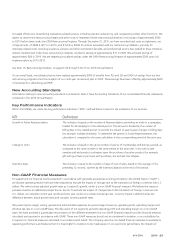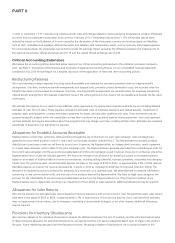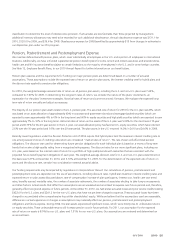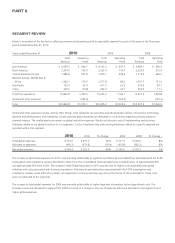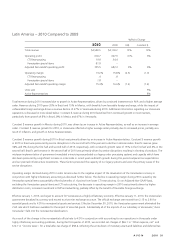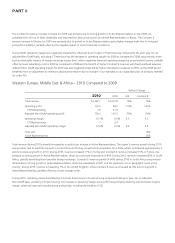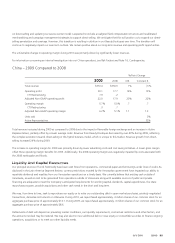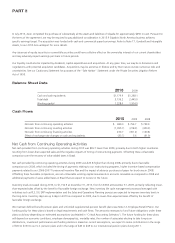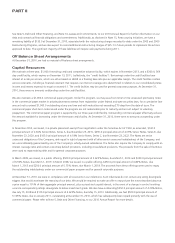Avon 2010 Annual Report Download - page 44
Download and view the complete annual report
Please find page 44 of the 2010 Avon annual report below. You can navigate through the pages in the report by either clicking on the pages listed below, or by using the keyword search tool below to find specific information within the annual report.PART II
benefits. Additionally, certain nonmonetary assets must continue to be carried at U.S. historic dollar cost subsequent to the devaluation.
Therefore, the historic U.S. dollar costs impacted the income statement during 2010 at a disproportionate rate as they had not been
devalued based on the new exchange rates. As a result of using the U. S. historic dollar cost basis of nonmonetary assets, such as inventory,
acquired prior to the devaluation, operating profit during 2010 was negatively impacted by $81, for the difference between the historical
cost at the previous official exchange rate of 2.15 and the current official exchange rate of 4.30. Assuming no further devaluations, in 2011,
the impact on operating profit of the 2010 Venezuelan currency devaluations will be immaterial.
Currency restrictions enacted by the Venezuelan government in 2003 have impacted the ability of Avon Venezuela to obtain foreign
currency at the official rate to pay for imported products. Since 2003, Avon Venezuela had been obtaining their foreign currency needs
beyond the amounts that could be obtained at official rates through non-government sources where the exchange rates were less favorable
than the official rate (“parallel market”). In late May 2010, the Venezuelan government took control over the previously freely-traded
parallel market. Trading in the parallel market was suspended for several weeks in May and June and reopened as a regulated (“SITME”)
market in early June 2010. The government has imposed volume restrictions on trading activity, limiting an entity’s activity to a maximum of
$0.35 per month. The current limit is below the monthly foreign exchange requirements of our Venezuelan operations and, unless these
restrictions are modified, may have a negative impact on Avon Venezuela’s future operations. There is no assurance that the Company will
be able to recover the higher cost of obtaining foreign currency in the SITME market as compared to the official rate through operating
activities, such as increased pricing or cost reductions in other areas.
At December 31, 2010, we had a net asset position of $158 associated with our operations in Venezuela, which included cash balances of
approximately $120, of which approximately $116 was denominated in bolívares remeasured at the December 31, 2010, nonessentials
official exchange rate and approximately $4 was denominated in U.S. dollars. Of the $158 net asset position, approximately $134 was
associated with bolívar-denominated monetary net assets and deferred income taxes. Additionally, during 2010 Avon Venezuela’s revenue
and operating profit represented approximately 3% and (2)% of Avon’s consolidated revenue and Avon’s consolidated operating profit,
respectively. Avon Venezuela’s operating profit as a percentage of Avon’s consolidated operating profit was negatively impacted by 7 points
due to the Venezuelan special items.
During the fourth quarter of 2010, the exchange rate in the SITME market ranged within 5 to 6 Bolívares to the U.S. Dollar. To illustrate our
sensitivity to potential future changes in the nonessentials official exchange rate in Venezuela, if the nonessentials official exchange rate was
further devalued as of December 31, 2010, to a rate of 5.7 Bolívares to the U.S. dollar, which was approximately the rate on December 31,
2010, in the SITME market, or an approximate 25% devaluation, our results would be negatively impacted as follows:
• As a result of the use of a further devalued exchange rate for the remeasurement of Avon Venezuela’s revenues and profits, Avon’s
annualized consolidated revenues would likely be negatively impacted by approximately 1% and annualized consolidated operating profit
would likely be negatively impacted by approximately 2% prospectively, assuming no operational improvements occurred to offset the
negative impact of a further devaluation.
• Avon’s consolidated operating profit during the first twelve months following the devaluation in this example would likely be negatively
impacted by approximately 4%, assuming no offsetting operational improvements. The larger negative impact on operating profit during
the first twelve months as compared to the prospective impact is caused by costs of nonmonetary assets being carried at historic dollar
cost in accordance with the requirement to account for Venezuela as a highly inflationary economy while revenue would be remeasured
at the further devalued rate.
• We would likely incur an immediate charge of approximately $25 ($24 in “Other expenses, net” and $1 in “income taxes”) associated
with the $134 of Bolívar-denominated monetary net assets and deferred income taxes.
During 2010, costs associated with acquiring goods that required settlement in U.S. dollars through the parallel or SITME markets in
Venezuela included within operating profit were approximately $56. The amounts reported within operating profit during 2009, were
approximately $45.
At December 31, 2010, Avon Venezuela had pending requests submitted with an agency of the Venezuelan government for approximately
$76 for remittance of dividends and royalties to its parent company in the U.S. These outstanding requests had been periodically submitted
between 2005 and 2009.



